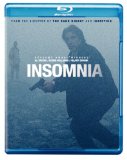| Reviews & Columns |
|
Reviews DVD TV on DVD Blu-ray 4K UHD International DVDs In Theaters Reviews by Studio Video Games Features Collector Series DVDs Easter Egg Database Interviews DVD Talk Radio Feature Articles Columns Anime Talk DVD Savant Horror DVDs The M.O.D. Squad Art House HD Talk Silent DVD
|
DVD Talk Forum |
|
|
| Resources |
|
DVD Price Search Customer Service #'s RCE Info Links |
|
Columns
|
|
|
Insomnia
Warner Bros. // R // July 13, 2010 // Region 0
List Price: $24.98 [Buy now and save at Amazon]
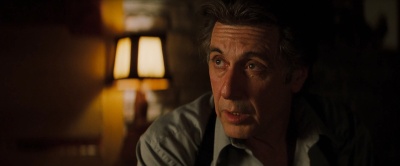 |
| [click on the thumbnail to enlarge] |
Dormer is soon able to engineer a scheme to lure the killer of this beautiful young girl into a trap, and it works, at least to a point. The murderer quickly realizes he's surrounded, though, and he escapes into an impenetrable fog. Dormer follows in pursuit, and a flurry of shots are exchanged. As Dormer approaches the body of the man he gunned down, he sees not the killer of this young child but that of his partner. Eckhart, with his dying breaths, accuses Dormer of himself being a cold-blooded murderer...that this isn't a tragic accident but the desperate act of a vindictive man. Dormer shouts for help, but when it comes time to explain what happened, he claims the killer they were chasing fired the fatal shot. Dormer is trusted and widely respected. The only other officer in close proximity didn't manage to catch a glimpse of what happened. He knows what he needs to do to shore up his claims into something airtight and unassailable. It
 |
| [click on the thumbnail to enlarge] |
...but then, in the wee hours of the morning, the phone rings. The murderer was certain Dormer would be awake; outsiders always are. That's not all the disembodied voice on the other end of the telephone knows, of course: he was just a few feet away when Dormer gunned down his partner, and having started to amass a body count himself, he can recognize a fellow killer when he sees one. Each holds the key to the other's downfall, but then again, the two of them could always come to some kind of understanding... This just adds that much more of a compulsion for Dormer to uncover the identity of the man on the other end of the phone. The local authorities' own investigation brings them down the same path towards this seemingly meek writer who'd beaten young Kay Connell to death. The closer they come to the killer, the closer they inch towards unraveling every case that Dormer's hands had ever touched. The threat of being exposed is as unrelenting as the sun beating down from above, and as Dormer's tormented by one sleepless night after another, his mind quickly starts to buckle under the strain...
Insomnia lulls viewers into a false sense of security, at first seeming to settle into a conventional police procedural and then sharply transitioning into something far more psychological. Christopher Nolan isn't interested in simply pulling back the curtain to reveal who murdered this young girl. That's well-trodden ground, after all. The torment of guilt...a conflicted man pitted against the Hobson's Choice of destroying his own future or undoing the many good works of his past...the neverending parade of sleepless nights and the resulting mental strain: all of this is of far more interest than just another whodunnit. Nolan builds on his fascination with noir with this morally conflicted character. The traditional noir setting would allow Dormer to slink into the shadows. Here, though, the ever-present sun throughout this Alaskan summer threatens to expose the darkness lurking within him. Nolan favors tight shots of Al Pacino, and perhaps it's that close intimacy with the camera that reins in his performance. He's not playing to the rafters or devolving into a deliriously over-the-top cariacture of himself as Pacino so frequently has in recent years. There are only a few incendiary bursts of anger, and they're well-deserved; Pacino is otherwise restrained. He recognizes that it's the smaller flourishes that ultimately define the character. Despite what he's done, Dormer's
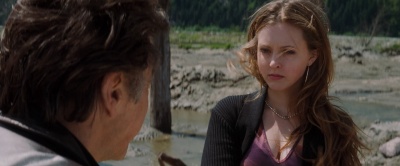 |
| [click on the thumbnail to enlarge] |
Will Dormer is a deeply layered and endlessly compelling character, and he's faced with an equally engaging foil. An antagonist who's sincere in his moral certainty, no matter how grisly his crimes may be, is far more compelling than a traditional moustache-twirling villain. Robin Williams contributes a terrific performance, and despite being introduced as a murderer -- far from a whodunnit, Insomnia never once toys with the possibility of doubt -- he too manages to be somewhat sympathetic. Walter Finch is a failure as a man. His lack of any meaningful commercial success with his writing is apparent, judging by the size and state of his cluttered apartment. Brilliant though he may be, Finch's seemingly unwavering confidence is easily shattered by his insecurities. I'm left with the sense that Finch isolates himself...escapes into the printed page...is a devastatingly lonely man whose thrills are limited to those he invents for his books. Attracting the attention of a beautiful teenage girl empowered him, there was briefly a mutual fantasy of escape from their humdrum everyday lives, and when the daydream withered away, a long-simmering, violent anger took its place. Almost all of this goes unspoken, and yet I'm certain that's the case. Williams creates layers that don't need to be explained through page after page of exposition; I can see it in his eyes and body language...the façade that masks the insecurity lurking underneath.
Insomnia does a remarkable job exposing the minds of these two characters, and it's approached in such a way that the viewer is able to draw his own conclusions. This builds a connection...a fascination...a compulsion...to follow them that a standard issue thriller couldn't hope to reproduce. As is the case with the finest works of noir, I'm even more engaged by who they are than I am by what they do. So too is the film itself. Insomnia
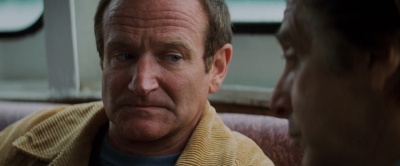 |
| [click on the thumbnail to enlarge] |
The film's more traditional genre setpieces are hit or miss. The first chase, blanketed in an impenetrable fog, is atmospheric and unnervingly intense. The breathless claustrophobia that follows later as Dormer loses his footing in a chase -- threatens to drown in the bitingly cold water as he's trapped beneath a log jam -- manages to be even more suspenseful. There's little action after that point, limited largely to a climactic shootout that's disappointingly conventional. It's a terrifically photographed sequence with some inspired imagery and a decent adrenaline rush, but this isn't the finalé that Insomnia demands.
Insomnia hasn't been embraced by admirers of Christopher Nolan's as fully as I'd expect. Perhaps it's that in the wake of Memento, its relatively straightforward storytelling -- no matter how skilled it may be, and no matter how deftly it redirects its focus -- may not have been what viewers anticipated. Maybe it's because Insomnia isn't as sprawling or epic in scale as The Prestige or either of his Batman films. Its tighter, more intense focus is a considerable part of the allure to me, though. Its sense of claustrophobia is integral to the film; Dormer being trapped in the walls of his sleepless mind, the lack of respite from the light of day, and its characters feeling imprisoned in this sleepy, hopelessly remote Alaskan town. This shouldn't be a bigger film than it is. The emphasis on performance...on revealing how densely layered these people are...is the driving hook. Insomnia succeeds not because of a high-concept premise (though there's that too) or overcranked genre theatrics but because its characters are so wholly fascinating. The pacing never once drags. My attention never wavered. There's not a wasted moment to be found. Sophisticated, intelligent, and endlessly engaging, Insomnia ranks among the most exceptional thrillers produced on these shores in the past decade. With all eyes on Nolan in the days leading up to the theatrical release of Inception, perhaps enough of that attention will be cast on Insomnia for it to be rewarded with some long overdue appreciation. Highly Recommended.
Video
Though
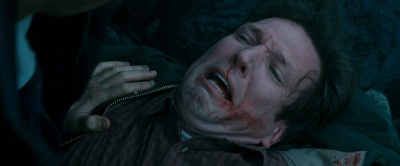 |
| [click on the thumbnail to enlarge] |
Insomnia takes full advantage of the capacity of this dual-layer Blu-ray disc. The bitrate of this AVC encode seems to be a touch healthier than average for a Warner release. A second feature length encode offers a truncated and rearranged version of the film to accommodate Christopher Nolan's unconventional audio commentary. As Nolan exclusively shoots his films in anamorphic, Insomnia is letterboxed to preserve its intended aspect ratio of 2.39:1.
Audio
The
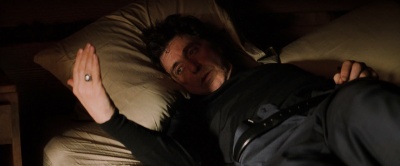 |
| [click on the thumbnail to enlarge] |
Insomnia also features two Dolby Digital 5.1 dubs, each encoded at a bitrate of 640kbps: one in French and the other in German. A 192kbps stereo Spanish track has been included as well. Subtitle streams are offered in English (SDH), French, German, Spanish, and Portuguese.
Extras
The most notable extra in this Blu-ray set is $7.50 in Hollywood Movie Money to see Christopher Nolan's Inception theatrically. Somewhat surprisingly, no promotional material for Inception is included on the disc itself.
- Additional Scene (3 min.; SD): Insomnia
features just one deleted scene: Rachel -- a sympathetic innkeeper played by Maura Tierney -- bumping into Dormer after she's packed the late Detective Eckhardt's things. This sparks a conversation between the two of them about how they choose to cope. Christopher Nolan offers optional commentary for the scene, one he rightly notes is well-written and beautifully performed, and his notes about why it was ultimately excised are more thoughtful than what I'm accustomed to hearing.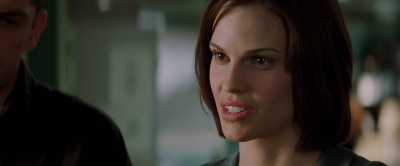
[click on the thumbnail to enlarge]
- 180: A Conversation between Christopher Nolan and Al Pacino (17 min.; SD): This interview between Insomnia's director and star casts a wider net than one might expect, frequently stepping outside discussion of the film itself. It's largely a discussion about the craft of filmmaking as a whole. Pacino draws from his expansive filmography -- including The Godfather, Scarface, and Dog Day Afternoon -- as touchstones. The two also speak about what rehearsals are truly meant to accomplish, building intimacy and trust rather than just an increased familiarity with the material.
- Day for Night: The Making of Insomnia (8 min.; SD): "Day for Night" digs deeper than the traditional making-of featurette, placing particular emphasis on the film's psychological approach and how to most effectively convey fatigue without causing the audience to doze off as well. Much of the talent on both sides of the camera are interviewed here, among them executive producer Steven Soderbergh.
- Eyes Wide Open (7 min.; SD): The condition of insomnia is explored in this featurette by a group of medical professionals and real-life insomniacs, and it's noted how faithfully the damaging aftereffects are reproduced in the film.
- In the Fog (6 min.; SD): Director of photography Wally Pfister and production designer Nathan Crowley each offer separate commentary over a reel of behind the scenes footage and excerpts from Insomnia. Pfister delves into how treacherous and all but inaccessible the location for the fog
sequence was, and from there, he moves into the technical aspects of creating and lighting this impenetrable bank of fog. Crowley's comments largely overlap, and the only standout note of his is that their fog would travel miles into the distance afterwards...that it wasn't content to just linger where it was created.
[click on the thumbnail to enlarge]
- Audio Commentaries: Somewhat intriguingly, despite the number of audio commentaries on Insomnia, there's not a single traditional one among them. Actress Hilary Swank, screenwriter Hillary Seitz, editor Dody Dorn, cinematographer Wally Pfister, and production designer Nathan Crowley lend their thoughts to individual sequences from the film. Each of them has been recorded separately, and these excerpted scenes run 42 minutes in total. The authoring of this Blu-ray disc allows them to be played indivudally or in one fell swoop. The three women -- and its screenwriter in particular -- have the most to contribute. Seitz explains how she approached this remake of Erik Skjoldbjærg's film from a different angle, delves into the rhythm she prefers when penning dialogue, and speaks at length about what distinguishes Insomnia from a standard issue procedural thriller. Dorn takes care to note how later passes at editing certain sequences better fleshed out the psychology of Will Dormer...the way he struggles with his guilt while still attempting to pull over this smokescreen. Pfister's comments are inspired as well, exploring the spontaneity Nolan encourages on the set, his approach to lighting, and ensuring that there's a constant sense of movement.
Director Christopher Nolan has a commentary all his own to contribute. What sets this apart from most is that he's speaking over an entirely different edit of the film. A second version of Insomnia has been rearranged into the order in which each sequence was originally shot. With each of them having the day and corresponding scene numbers attached, this approach offers a great deal of insight into why filmmakers choose to shoot their movies in a particular order. This edit runs somewhere around fifteen minutes shorter than the finished film. Nolan certainly doesn't have any trouble shouldering a commentary by himself. Many of his comments revolve around Insomnia's photography: how he shapes the viewer's perception of these characters and the world around them...how the camerawork in this film empowered the actors and informed their performances. Among the other highlights are how Robin Williams' decision to play the disembodied voice on the other end of the phone before ever stepping in front of the camera impacted his relationship with Al Pacino, how the traditional dynamic between the deranged killer and rational cop is upended here, and an in-depth exploration of the
foggy chase that's ultimately the driving force for the rest of the film. Nolan is never at a loss for something to say, and his commentary is free of any gaps or awkward pauses. This track is more technically-oriented than most, but as someone with a long-standing fascination with the craft of filmmaking, I don't consider that to be a downside in the slightest. This is an unconventional audio commentary but that's what makes it such a rewarding listen. It addresses material that usually goes untread and inspires listeners to think about the films they watch in a very different way.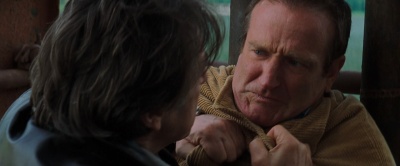
[click on the thumbnail to enlarge]
- From the Evidence Room (HD): Insomnia's high resolution still gallery features a couple dozen production shots and behind-the-scenes photos as well as a look at its original theatrical one-sheet.
- Trailer (2 min.; SD): Rounding out the extras is a standard definition theatrical trailer.
The Final Word
Insomnia has been somewhat underappreciated over the past few years, hopelessly overshadowed by Christopher Nolan's more ambitious films and the spectre of the universally adored Norwegian thriller that inspired it. Hopefully this high definition reissue will earn Insomnia the attention that this unrelentingly gripping psychological thriller so richly deserves. Though the film certainly has its brief dalliances with frantic chases and the occasional shootout, Insomnia is ultimately a noirish character study more fascinated with emotional and mental intensity rather than the usual genre theatrics. This is an intelligent and remarkably well-crafted film that should prove to be a rewarding discovery on Blu-ray for those who've yet to experience it. Those who may have dismissed Insomnia in the past should consider giving the film a second look. The bulk of the complaints I've seen have been strictly by comparison, and approaching the movie for what it is rather than arguing how it stacks up next to Memento, The Prestige, or the Norwegian original may cause a considerable change in opinion. Highly Recommended.
|
| Popular Reviews |
| Sponsored Links |
|
|
| Sponsored Links |
|
|
| Release List | Reviews | Shop | Newsletter | Forum | DVD Giveaways | Blu-Ray | Advertise |
|
Copyright 2024 DVDTalk.com All Rights Reserved. Legal Info, Privacy Policy, Terms of Use,
Manage Preferences,
Your Privacy Choices | |||||||









